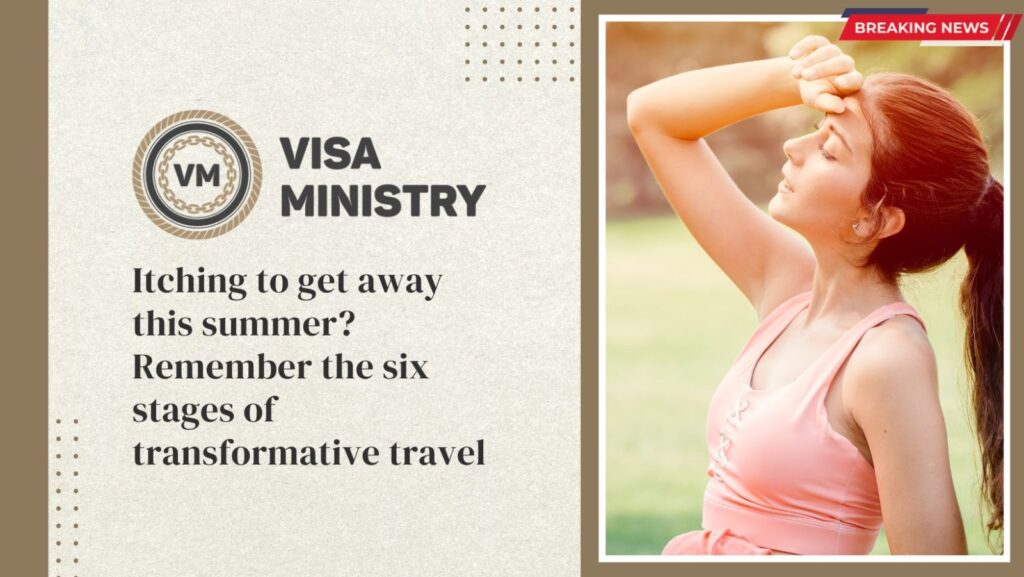I left on a motorbike in June 2022 for a 10,650-mile, six-week journey from Tennessee to Alaska and back, just taking my GPS and phone. Despite the horror stories of cancelled and delayed flights, the ride marked the beginning of a year of research-related travel, and I couldn’t be happier.
People were travelling pretty much wherever I visited, even in the farthest reaches of the Yukon and British Columbia. The fact that so many of the trailers being towed were new suggests that their owners had just recently purchased them. People appear to be just as eager to leave after yet another miserable pandemic winter.
But why do we even go on vacation? What draws people to the open road?
I research experiences that straddle the three disciplines of religion, psychology, and culture. In addition, I’m fascinated with travel’s intractable paradoxes: In order to slow down and be present, many of us travel quickly to our destinations. We may also care about the environment, yet we still leave carbon footprints.
In the end, a lot of individuals want to come back changed. Travel is sometimes seen as what anthropologists refer to as a “rite of passage”: planned rituals in which people leave their familiar environments, go through change, and then come back revitalised or “reborn.”
However, travellers are not only thinking about themselves. In my most recent book, “Just Travelling: God, Leaving Home, and a Spirituality for the Road,” I make the case that the drive to travel may be a characteristic that defines humanity. But doing so is a privilege, and one that the host communities may have to pay for. Scholars and the tourism industry are both becoming more and more interested in ethical travel, which limits the harm that tourists cause to the areas and people they visit.
The media constantly bombards travellers with suggestions and allures on where to go and what to do. However, the “why” and “how” of transformative, ethical travel necessitate greater discernment in order to achieve their more profound objectives.
As I conducted research for my book, I examined travel narratives found in sacred texts as well as the findings of psychologists, sociologists, ethicists, economists, and tourism experts. I contend that meaningful travel is better understood as a six-phase practise built on fundamental human experiences rather than as a three-stage rite. Similar to how adventures twist and turn, these stages might recur and overlap over the same voyage.
A group of six individuals are seated and conversing on a fence with hills in the backdrop while wearing brightly coloured clothing.
On June 17, 2022, tourists are seated on street seats in Dharmsala, India. By Ashwini Bhatia for AP
1. Considering
Travelling starts well before travel as we plan and conduct study. However, anticipation is more than just planning. It’s appropriately referred to as “voorpret” in Dutch, which means “the pleasure before.”
Even when it comes to bias, how and what individuals expect in a certain scenario has the capacity to influence how they really feel about it. According to psychological studies, for instance, children’s prejudice towards their own group might be lessened when they expect increased cooperation across groups.
However, phenomenology, a branch of philosophy that examines human experience and consciousness, emphasises that anticipation is also “empty”: our conscious intentions and expectations of what’s to come could be realised or dashed by a future moment.
Travellers should strive to have an open mind to ambiguity and even disappointment in light of that.
2. Departure
Deep emotions connected to our earliest separation experiences might be reawakened by leaving. The attachment patterns that psychologists examine in young children influence how secure people feel in their relationships as adults. These encounters may also have an impact on a person’s comfort level while venturing out and travelling away from home.
Before the relief and joy of leaving, some travellers sense exhilaration, while others hesitate or feel guilty. Anxiety may be managed by being mindful of the various stages of travel.
3. Submission
Travellers have little control over their route: a flight is cancelled, a car breaks down, the forecast calls for sunlight, yet it pours nonstop for days. They have to give up to the uncertainty to some extent.
In contemporary Western societies, “surrendering” is typically seen negatively—as flying a white flag. But as a therapeutic idea, surrendering aids individuals in letting go of stifling habits, finding a sense of wholeness, and sharing togetherness. The perfectionist overcomes her fear of failing by realising that an altered plan doesn’t necessarily result in a less enjoyable trip. When getting care from strangers, a person with a strong sense of independence becomes more vulnerable.
In reality, according to certain psychological theories, the ego yearns for emancipation via surrender—letting down its protective walls and ceasing to try to control one’s environment. Accepting that perspective might make it easier for travellers to deal with the possibility that things might not go as planned.
4. Gathering
The invitation to meet, the fourth stage of travelling, is to rediscover oneself and others.
Cross-cultural communication is more challenging due to each culture’s engrained traditions and “rules of recognition,” which are all unconscious. Travellers may have prejudices about certain people, places, or things that are conscious or unconscious, while hosts may have stereotypes about how wealthy, illiterate, and exploitable travellers are.
Travellers must be aware of activities that might aggravate encounters in order to go past such prejudices, such as adhering to clothing requirements or understanding what topics to avoid during conversations.
The effects of colonisation are still felt in many areas of the world, which makes it more difficult for individuals to interact in genuine ways. Westerners’ opinions of non-white populations as exotic, frightening, and inferior are still influenced by colonial perspectives.
Starting to break down these barriers calls for a mindset known as cultural humility, which goes beyond “cultural competence,” or merely being aware of other cultures. Travellers who are culturally humble can say things such, “I don’t know,” “Please help me understand,” or “How should I…?”
On a narrow, congested pedestrian street, a man pulling two small suitcases wears a white shirt.
On June 20, 2022, tourists stroll through the heart of Rome. Andrew Medichini/AP Photo
5. Compassion
Caring entails overcoming “privileged irresponsibility,” which occurs when a traveller fails to accept responsibility for their privilege or fails to acknowledge the lack of privilege of others.
[Two news sources and one religious periodical. Get news from the AP, RNS, and The Conversation.]When travellers disregard the injustices and disparities they see or how their journeys affect the developing climate catastrophe, they are engaging in irresponsible travel. In terms of ethics, “empathy” is insufficient; rather, travellers must work towards solidarity as a form of “caring with.” That might entail using regional guides, dining at family-run establishments, and being aware of how they use resources like food and water.
6. Going back
Travelling does come to an end, and going home again might be confusing.
Returning home might result in reverse culture shock if travellers find it difficult to reorient. But as visitors share their experiences with others, remain connected to the places they visited, learn more about the area and its people, plan a potential return trip, or get involved in causes they learned about on their trip, that shock may lessen.
I think that considering these six stages might encourage the type of attentiveness required for transformational, moral travel. And in the midst of a pandemic, it is obvious that considerate travel that puts the welfare of host communities first is necessary.
SOURCE – theconversation

